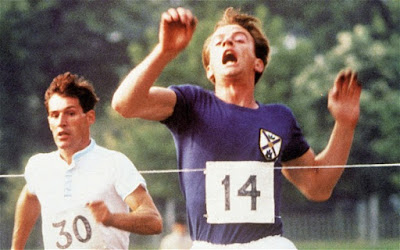 |
| Image Source |
Year: 1981
Rating: PG
Running Time: 2 hours, 5 minutes
Two runners compete for Great Britain during the 1924 Olympics. Their religions impact their desire to race.
Whenever we sit down to watch period piece films, we always fear they will be stuffy, dry, and frankly, dull. Some era-specific films like "Barry Lyndon" and more recently "The Favourite" escape this problem. "Chariots of Fire," however, does not. This is the second time we have watched it, and we basically feel the same way about it that we did after our first viewing. For us, it fails in creating interesting characters and a compelling narrative. Some of the characters are so poorly developed that we lost track of who people actually were. They all literally look the same! Maybe if we cared more about the 1924 Olympic track and field events or the religious conflict these men faced, we'd be more compelled, but alas, we do not. Both Liddell and Abrahams are almost entirely defined by their faith and heritage. Liddell is a devout Christian and refuses to run on the Sabbath. It is his need to spread the word of God that drives his athletic ability and gives him his desire to run. Abrahams is Jewish and feels like he always has to prove himself to all of the Protestants that surround him. This is what gives him his drive to compete. While we respect the hell out of the fact that they stuck to their guns, even in the face of potentially not being allowed to compete in the Olympics, the story doesn't feel fully realized and squanders its potential. The two men face so little in terms of obstacles in pursuit of their Olympic dreams that it feels like there are almost no stakes. The movie makes it feel as if Liddell and Abrahams are favorites to win, and it fails to build up the strength of their American competition, which is only briefly mentioned. Because of this, there is virtually no excitement when the final showdown comes to fruition. Most of this film is rather unmemorable except for its iconic theme song and title sequence, which boasts the men running on a beach in an oft-parodied opener. It seems like this sequence was included because those behind the scenes thought it would look super cool, but it's not actually necessary within the context of the film. Speaking of its theme song, which is easily the best part of the movie, the remainder of the Oscar-winning score by Vangelis doesn't always fit the film itself. Sometimes, it feels perfectly placed, but other times, it sounds more like a sci-fi score than that of a period piece drama about running and religion.
 |
| "If you were my age, with a chance to win the championship in Paris, you'd be just as big a fool as I am." (Image Source) |
If nothing else, "Chariots of Fire" is a great source of slow-motion shots of people making ridiculous faces as they run. Just look at the pictures on this review if you don't believe us! This film is directed by Hugh Hudson, who is known for directing movies like "Greystoke: The Legend of Tarzan, Lord of the Apes" and "I Dreamed of Africa." The screenplay is written by Colin Welland, who has worked on films like "Yanks" and "Twice in a Lifetime," but is far more experienced in the world of television. This film tells the true-life story of British Olympic runners Harold Abrahams (Ben Cross) and Eric Liddell (Ian Charleson). It primarily focuses on how their religions influenced their running and how it played into their love of the sport and their drive to win.
 |
| "I had to look for him. It's absolutely fundamental. You never look." (Image Source) |
 |
| ""He runs like a wild animal. (Image Source) |
In the end, though "Chariots of Fire" isn't the worst movie to be nominated and/or win a Best Picture Oscar, we can't say we genuinely enjoy this film.
BigJ's Rating: 5/10
IMDB's Rating: 7.2/10
RT Rating: 83%
Do we recommend this movie: Meh.
No comments:
Post a Comment